Balenciaga logo and symbol, meaning, history, PNG
 Balenciaga Logo PNG
Balenciaga Logo PNG
Balenciaga is a high-end French fashion brand, which was created in 1955 by Cristobal Balenciaga. Demna Cvasalia is the brand’s creative director since 2015.
What is the symbol of Balenciaga?
The official logo of the Balenciaga fashion brand is a clean minimalistic logotype in the uppercase of a modern geometric sans-serif typeface. The primary version of the badge has no additional elements. Although sometimes the brand still uses a BB insignia, which was an essential part of the label’s identity until 2013. This monogram is composed of two uppercase letters “B” standing back-to-back and connected by three short diagonal lines.
Mục lục
Meaning and history
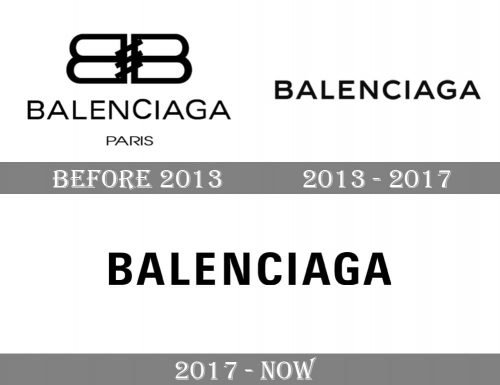
Like most of the luxury fashion brands, Balenciaga features a very simple yet extremely elegant logo, composed of a monochrome wordmark, which looks exquisite and confident on any background, including boutique banners and printed textiles of the label’s runway items.
1917 – 2013
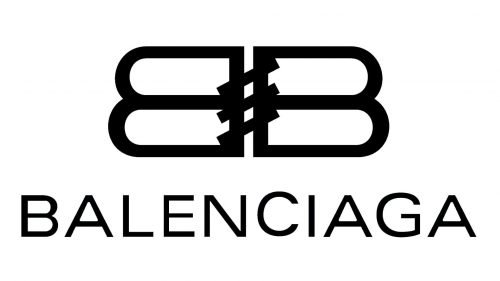
The very first logo for Balenciaga was introduced in 1917 and boasted an elegant capitalized inscription placed under the light yet strict and strong emblem, composed of two letters “B”, placed back-to-back and connected with three diagonal lines, representing stitched and pointing on the brand’s fashion direction and specialization. The logotype was written in a lightweight sans-serif typeface, which was very similar to such fonts as FM Bolyar Sans Pro 400 and Zurich Std Roman Extended. There was also a small “Paris” tagline placed on the bottom level of the emblem.
2013 – 2017
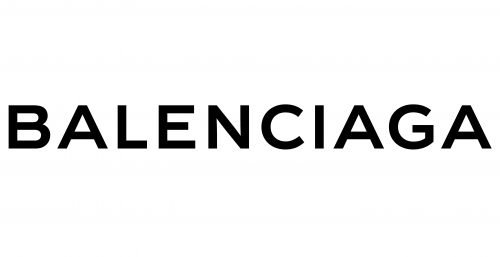
The redesign of 2013 made the Balenciaga logotype bolder and more solid. Its capital letters were now written in another typeface, with thicker lines and less place between the symbols. The new font of the fashion house was close to Sweet Sans Medium Small Caps and looked traditional yet sleek. As for the emblem, now it was not used on the official version of the logo, yet still could be seen on the brand’s prints and some materials.
2017 – Today
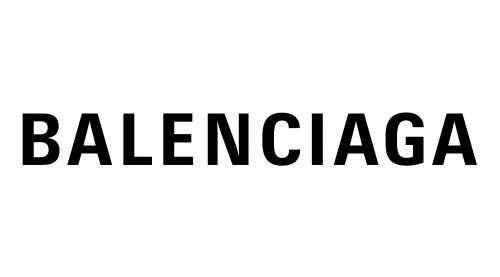
When Demna Gvasalia became the Balenciaga creative director, he decided to change the brand’s philosophy, making it more street-style and easy, and the logotype was redrawn according to these new principles. It was maximally shortened and simplified.
The typeface was narrowed and gained bolder lines, looking more modern and common. As for the emblem, the iconic stitched “B”s are still used by the brand, but more often another combination can be seen — two letters back to back with no connecting lines. There is also a geometric version of the emblem, where “B” is glued to each other and are formed by four square segments.
Font and color
The current Balenciaga logotype is executed in a condensed version of the previous font used by the brand. Its letters became narrower and taller, looking stronger and more stylish, being bright even without any additional. The font of the label’s logotype is similar to Zurich STD Bold Condensed and Shilia Condensed Heavy.
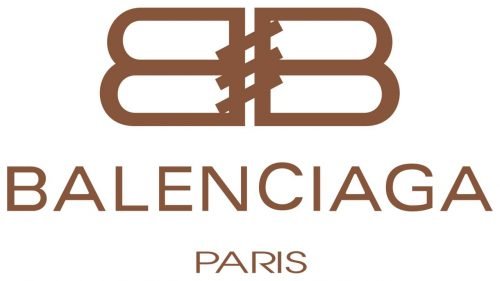 The monochrome color palette of the Balenciaga logo is a brilliant choice, as the brand likes working with bright and acid colors and complicated combinations, so black lettering on a white background make up the tag, which will look elegant and timeless on any background.
The monochrome color palette of the Balenciaga logo is a brilliant choice, as the brand likes working with bright and acid colors and complicated combinations, so black lettering on a white background make up the tag, which will look elegant and timeless on any background.
Is Balenciaga French or Italian?
Balenciaga is a luxury fashion house from France, which was established in the middle of the 1950s and named after its founder, Cristobal Balenciaga. Balenciaga was born in Spain, and their first step in the fashion industry was the design made in Basque Country.
What is the meaning of Balenciaga?
Balenciaga is the surname of the famous Spanish designer Cristóbal Balenciaga, who founded a luxury fashion house, named after him. The Balenciaga brand, established in 1955 in Paris, today is known all over the globe and is considered to be one of the top world fashion industry players.
Who owns Balenciaga?
The Balenciaga fashion brand is owned by Kering, a global corporation, that specializes in luxury brands, and is based in France. Kering was established in 1963, and today owns such brands as Yves Saint Laurent, Brioni, Gucci, Alexander McQueen, and several others.






